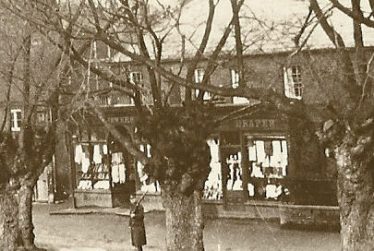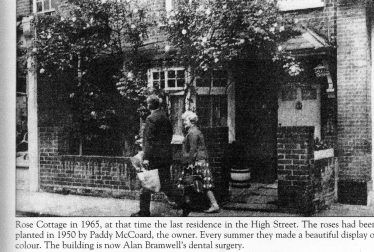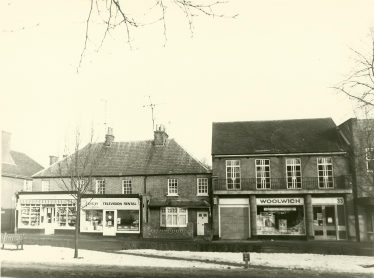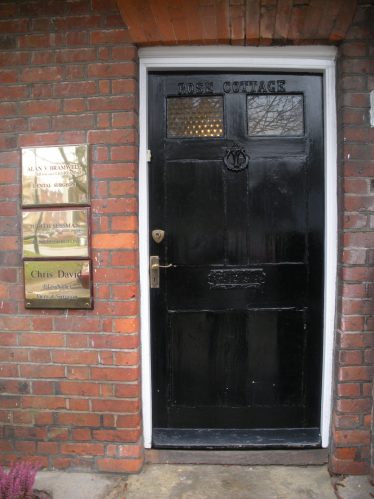Rose Cottage, High Street
From general drapers to dental surgery




In 1874 my grandfather Oliver Jewers took his bride Hannah to live at Rose Cottage in Harpenden High Street. Close by on a green was the Cock pond with its ducks sharing the water with cattle and horses taken there by local farmers.
In those days Rose Cottage, with its bedrooms running over the drapery store beneath, extended to Thompson’s Close. My first memory of it in the 1920’s as a young child is of lying in bed at night listening to the rustlings of scores of bats which roosted in the attics above and occasionally – with great excitement – actually seeing a barn owl on the upstairs landing. Modern conservationists would have appreciated my grandparents’ tolerance of these fascinating creatures in their home!
The shop was divided into two main areas. One room, with a stockroom behind it, contained all manner of drapery and included a vast square mountain of knitting wool in every colour and texture. I found great delight in kicking off my shoes and clambering to the top of this great pile – only to be resoundingly scolded by grandfather’s charming assistant, Miss Hucklesby. The much larger part of the store was graced by a beautiful wide fireplace, complete with roasting spit (which had long gone out of use). In this area was stocked a plethora of items ranging from every kind if ironmongery to boots and shoes. Near the front entrance stood a bin full of sheets of leather from which were cut stout pieces for customers to use for heeling and soling their own footwear. I can still smell the delightful aroma of those splendid hides. Sometimes my grandfather would take pity on a poor man and give him some leather or even a new pair of boots (discreetly wrapped up in an old newspaper).
Hundreds of little drawers
The shop was dark, lit only by gaslamps, and it was usual for a length of cloth or a reel of cotton to be taken to the door so that the colour could be better judged. Behind the stout oak counter which ran along one side of the room were hundreds of little drawers containing nails, screws, washers, buttons, hooks, curtain rings of many sizes and dozens of other items useful to the handyman.
Behind this main part of the store was a small narrow room with a window looking out on the garden across to the back door of Rose Cottage, from which at lunchtime grandmother would carry over a tray of food and a bottle of Whitbread’s ale for her husband. Next to the little room was a large wooden barn where all the waste cardboard and packing paper was thrown. Periodically grandfather would light a tremendous bonfire in there and I was intrigued to see fat brown rats scampering away from danger. At intervals he would make determined efforts to get rid of them but they continued to flourish on their cardboard diet.
The garden, pretty in spring with apple blossom and bulbs in flower, sloped up a gentle hill at the back. Herbs, roses and a few other blooms grew there, but very little else – neither of my grandparents were keen gardeners although they had a deep knowledge of birds and wild plants. Grandad loved to go for long country walks and he taught his favourite grandson, Anthony Perry, how to swim in the River Lea. Cousin Tony enjoyed visiting the Steabben family at the far side of Church Green to see the sheep in the small field behind and to take a bloodthirsty relish in watching their slaughter for sale in the Steabbens’ butcher shop.
Life over the shop
There were no modern conveniences in Rose Cottage and my grandmother worked hard to maintain a happy and comfortable home. As there was no bathroom, taking a thorough wash was something of a performance. Water was boiled in a huge copper and ladled into a hip bath placed near a roaring coal fire in what now might be described as a utility room. This had a paved floor, a stone sink with only cold water on tap, a giant mangle, a kitchen range with two ovens and an array of gleaming copper pots and pans. Another range – blackleaded every day – was in the breakfast room, also at the back of the house.
In 1931 my grandparents left ancient Rose Cottage (and the arduous trip to the garden in all weathers). Moving to the modern plumbing of a new house in Crabtree Lane, just below the railway bridge.
My grandfather was a kind and generous man, who gave away too much ever to be rich. Right up to his last year in the High Street he enjoyed a regular autumn ritual when, for several days running, he would pick quantities of apples, carry them to the door in the large metal tray from the shop scales, and throw them out for the local children to catch. More than once the ‘Herts Advertiser’ published a photograph of this scene, on one occasion heading it APPLE SQUASH.
The first plant he ordered for the new Crabtree Lane garden was an apple tree, but sadly he died in 1932 before it fruited, followed a year later by grandmother Hannah who had no wish to live without him.

Comments about this page
I remember Rose Cottage very well and also the McCord family who lived at 3 Bloomfield Rd when I lived at no.7. We all played together for many years in the 1940/50’s along with Dave Peters who lived at no.5. Sadly he died a few years ago. Happy childhood memories!
I love this story. My mother lived here and her father (my grandfather) WAS Paddy McCord! Lovely story. I wasn’t born when they lived there. Paddy died sadly years before I was born and my Nana in 2002 but my mother and uncle have fond memories of Rose Cottage. Thanks for the story. Caroline (daughter of Shelagh McCord). x
I am one for picking up atmospheres and the atmosphere in Rose Cottage is one of love and harmony. I get a strong feeling there was much love in this place and the marriage in question was sound and very very loving. Today the wonderful and caring dental surgery echoes and continues this.
Memories of Jewers shop – extracts from contributions to a competition organised in 1978 by the Local History Society on “1 remember .. Harpenden before 1914”
“Another old shopkeeper whose name I remember was Oliver Jewers, who kept a very old-fashioned general drapery store. … There was hardly room to move inside Mr Jewer’s shop for the varieties of stock which were stocked on both sides of the counter. Long strings of boots (shoes were almost unheard of in those days) hung from the ceiling, sports clothes and ordinary apparel, as well as piece goods, rugs and the like. Any spare space was filled with large coloured advertisments, showing couples ice-skating, men playing football in shorts that came well down to the knees.”
By J Anthony Wibberley, who was born in Harpenden in 1898 and lived here until the early 1920s.
“Mr Jewer’s famous shop stood on the site at present occupied by The Studio [1979]. Whatever one bought was always “only” this or that – say one spent two pence and three farthings, it would be “only” – or perhaps it might be “only ten shillings and one penny. It would be easier to say what Mr Jewer did not stock rather than what he did!”
By Miss T Marjorie Gilchrist
Extract from Betty Walthew’s childhood reminscences – see “Old Time Shopping (just before World War 1) in Childhood
Buying “combs.” at Jewers
“After we’d made our purchases, there always seemed shopping to be done to replenish our wardrobes. My most vivid memory is being taken by Nanny to Oliver Jewers, a shop in High Street, to buy our combinations. We hated combs., but there was slight compensation in the way the contents of the shop were arranged. The combs. wrapped in buff coloured paper packets, according to their size, were piled on shelves, each secured by string in a most intriguing way. One pull on the knot amd it came undone with an explosive sound and all was revealed. Having settled on the packets containing our sizes, the system went into reverse and the string replaced with the same fascinating “ping” which had attached it.
“Sometimes Nanny bought some knickers from another shelf and we watched with interest while she made her choice, the discarded packets ending with the explosive sound of the replacement of the string. A visit to Oliver Jewers almost made up for the indignity of wearing combs. when most of our friends wore vests.”
Add a comment about this page